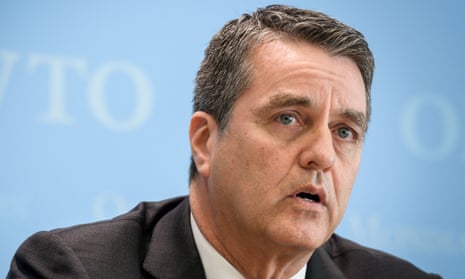The World Trade Organization’s chief has announced he is quitting more than a year before the end of his term, threatening moves to lift trade barriers and forge greater global cooperation in the wake of the coronavirus pandemic.
Roberto Azevêdo will leave in August. The 62-year-old Brazilian has served as director-general since September 2013 and his second four-year term had been due to end in August 2021.
In recent weeks Azevêdo has joined leaders of the International Monetary Fund and World Bank in calling for countries to put aside their differences and reduce trade barriers to support economic growth.
In a statement he said the decision to step down was personal and the timing allowed for a successor to be chosen well before WTO council meetings next year.
Defending the organisation, which has come under sustained attack from free market supporters, especially in the US, he said: “The WTO may not be perfect, but it is indispensable all the same. It is what keeps us from a world where the law of the jungle prevails, at least as far as trade is concerned.”
The 25-year-old organisation’s main function is to help negotiate multilateral trade deals. It also aims to settle cross-border commercial squabbles in its dispute resolution body and monitor trade flows.
However, the WTO club of 164 members has not produced any major international agreements on trade since abandoning Doha round negotiations in 2015.
Its members have spent several years attempting to cut subsidies for fishing in order to allow a revival of depleted fish stocks. A parallel discussion to agree the terms of e-commerce across borders has also foundered, mainly following blocking moves by Washington to protect Amazon, Facebook and Google.
Azevêdo was known to be frustrated by the ongoing tit-for-tat battle over import tariffs between the US and China, which dented global trade during 2018 and 2019, and the US refusal to allow appointments to the WTO’s appellate body, effectively paralysing its ability to adjudicate trade disputes since last December.
The US has been joined by Japan and the EU in calling for changes to reflect the growing power of Beijing, which has refused to end state subsidies for domestic industries and imposed strict demands on foreign firms operating in China.
US Republicans came to see the WTO as siding with Beijing, allowing it to become the world’s most powerful manufacturer at the expense of the US.
Josh Hawley, a Republican senator from Missouri, recently claimed the WTO was an outmoded relic and a barrier as the US sought to fight Chinese “imperialism”.
After news of Azevêdo’s decision to leave, Hawley tweeted: “Just turn the lights off as you go.”
However, a recent academic study concluded the US, China and Germany had benefited most from joining the WTO. The US added $87bn (£71bn) a year to its GDP, while China gained $86bn and Germany $66bn.
The total increase in prosperity amounted to $855bn a year for all its 164 members worldwide or 4.5% of GDP per member country, the study found.
